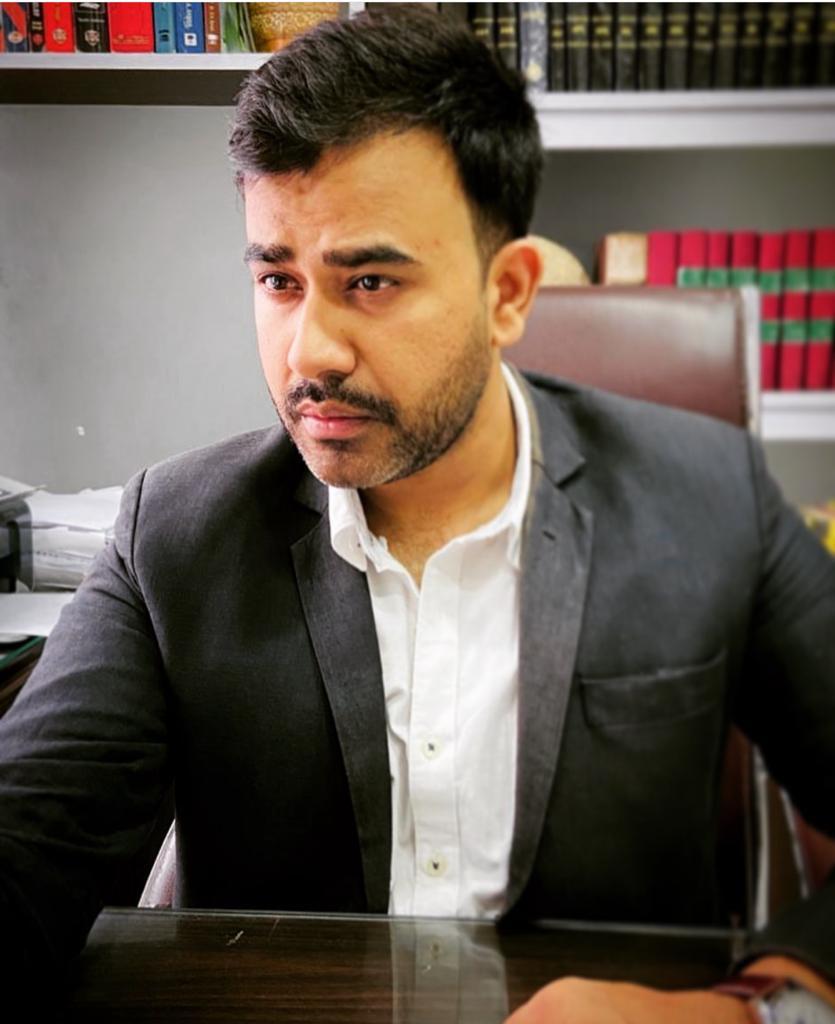This interview has been published by Namrata Singh and The SuperLawyer Team
Dr. Anagh Mishra, your journey through the legal landscape, from the hallowed halls of ILS Law College to being an Advocate-on-Record at the Supreme Court, is quite intriguing. Can you share a memorable anecdote from your early days as a law student that still brings a smile to your face?
Reflecting on my law college days, one standout memory that brings a profound sense of accomplishment is when the Placement Cell chose my CV to be the exemplar for the forthcoming batches. The announcement came as both a surprise and an honor, underscoring the meticulous effort I had invested in crafting a CV that not only showcased my achievements but also adhered to the highest professional standards.
The recognition from the Placement Cell carried significant weight, knowing that my CV would be presented as the ideal template for fellow students navigating their own paths into the professional realm. It wasn’t just a personal triumph; it became an opportunity to contribute to the success of my peers and offer guidance through a tangible example.
The experience highlighted the importance of attention to detail in the professional realm, emphasizing the impact a well-crafted CV can have on one’s career trajectory. This moment stands out as a testament to the collective growth and support within our academic community, shaping not only my journey but also contributing to the broader success of aspiring legal professionals.
Your expertise spans areas like environmental activism, corporate laws, and intellectual property. How do you find harmony or balance between such diverse legal realms, and do you have a favorite area of practice among them?
Navigating diverse legal realms such as environmental activism, corporate laws, and intellectual property requires a thoughtful approach to finding harmony and balance. One of the key strategies is to identify overreaching principles and interdisciplinary connections that exist among these areas.
Environmental activism often intersects with corporate laws, especially in areas such as sustainability, compliance, and corporate social responsibility. Intellectual property, on the other hand, plays a crucial role in safeguarding innovations related to environmental technologies. Recognizing these interconnected threads allows for a more holistic understanding of the legal landscape. The intersection of IPR and environmental concerns has become increasingly crucial, particularly as technological innovations play a significant role in addressing environmental challenges, and that was primarily the issue addressed in my Ph.D. thesis.
To maintain balance, I prioritize staying informed about the latest developments in each area through continuous learning and networking. It’s essential to understand the broader context in which legal issues arise and how they may impact multiple sectors simultaneously.
As for having a favorite area of practice, each realm brings its unique challenges and opportunities. Environmental activism allows me to contribute to a cause I am passionate about, corporate laws provide a strategic and business-oriented perspective, while intellectual property allows for creative problem-solving. The diversity keeps my work dynamic and intellectually stimulating. While I may not have a singular favorite, I appreciate the synergy that arises from integrating insights from these different legal spheres, fostering a well-rounded and comprehensive approach to my practice.
Apart from your legal practice, you’re actively involved in publications covering topics from biosafety to landlord-tenant disputes. What drives your interest in legal writing, and how do you choose the topics you want to explore and share with the legal community?
Engaging in legal writing beyond my legal practice is a passion rooted in a desire to contribute to the legal community and share insights on a diverse range of topics. Several factors drive my interest in legal writing.
Firstly, legal writing provides a platform to contribute to the ongoing discourse within the legal profession. It allows me to share my perspectives, research findings, and practical experiences with a broader audience, fostering a sense of community and knowledge exchange.
The choice of topics stems from a combination of current legal trends, emerging issues, and areas where I believe I can offer meaningful insights. Whether it’s biosafety, landlord-tenant disputes, or any other legal subject, I aim to select topics that are relevant, timely, and have the potential to impact practitioners, scholars, and the general public.
Furthermore, my interest in diverse topics reflects a commitment to staying well-rounded and informed across various legal domains. It allows me to continuously expand my knowledge base and adapt to the evolving landscape of the legal profession.
Ultimately, the driving force behind my legal writing is a genuine passion for the law and a commitment to contributing positively to the legal community.
You’re known for handling PILs addressing air pollution in Uttar Pradesh and the disposal of used cooking oil. How does it feel to make a legal impact on issues that affect people’s daily lives, and what kind of challenges do you encounter in such cases?
Handling Public Interest Litigations (PILs) majorly concerning public health has been a deeply fulfilling yet challenging aspect of my legal career. Making a tangible impact on issues that significantly influence people’s daily lives carries a profound sense of responsibility and purpose.
The satisfaction derived from contributing to environmental and public health improvements is immeasurable. Knowing that legal actions have the potential to enhance air quality in communities or establish proper mechanisms for the disposal of used cooking oil creates a direct link between legal advocacy and the well-being of individuals.
However, these endeavors are not without their complexities. Environmental litigation often involves navigating intricate regulatory frameworks, scientific intricacies, and sometimes resistance from industries or entities with vested interests. Crafting legal arguments that effectively convey the gravity of environmental issues to judges and stakeholders requires a meticulous understanding of both legal principles and scientific evidence.
The prolonged nature of legal processes in PILs demands unwavering persistence and dedication. Challenges may arise not only within the courtroom but also in coordinating with diverse stakeholders, including government agencies, environmental experts, and impacted communities. Striking a balance between these various interests and ensuring that legal actions align with the broader public interest adds layers of complexity to the work.
In conclusion, while PILs addressing environmental concerns pose challenges, the opportunity to contribute meaningfully to societal well-being through legal advocacy is unparalleled. The convergence of legal expertise, scientific knowledge, and a commitment to positive change makes this aspect of legal practice exceptionally rewarding. It underscores the transformative potential of the law in addressing pressing issues that impact the lives of individuals and communities.
Your educational journey includes a Ph.D. on ‘Intellectual Property Regime and Protection of Biodiversity.’ How has this academic pursuit influenced your approach to legal practice, and have there been instances where your academic insights shaped your strategy in a case?
Certainly, my Ph.D. journey on ‘Intellectual Property Regime and Protection of Biodiversity’ has significantly influenced my approach to legal practice and has proven instrumental in shaping strategies in various cases.
Acquiring in-depth knowledge in this specific area has provided me with a nuanced understanding of the intersection between intellectual property laws and biodiversity protection. This academic background has enhanced my ability to identify novel legal arguments, foresee potential challenges, and craft more comprehensive and strategic approaches when dealing with cases that involve issues related to biodiversity and intellectual property.
In addition to your professional achievements, we’d love to know more about your personal interests. Do you have any hobbies or activities outside of the legal world that you find helps you unwind and recharge?
Absolutely! Beyond my professional achievements, my life is enriched by three passions that bring me immense joy and fulfillment – cooking, gardening and travelling.
Cooking is a delightful journey into the world of flavours and culinary traditions. The art of preparing authentic Italian dishes allows me to experiment with fresh ingredients, herbs, and spices, creating dishes that are not just meals but experiences. It’s a culinary adventure and feeding people that I find both therapeutic and rewarding.
Gardening is another cherished aspect of my life. Tending to plants, cultivating green spaces, and witnessing the growth of a garden provide a serene escape. The hands-on connection with the soil, the vibrant colors of blooming flowers, and the satisfaction of nurturing life contribute to a sense of tranquility and balance in my everyday life.
Travel is my constant companion in the pursuit of new experiences and perspectives. Whether it’s strolling through historic streets, savouring local delicacies, or taking in breathtaking natural scenery, each journey adds a unique chapter to my life’s story.
One of your recent achievements is clearing the prestigious Advocate on Record examination in your first attempt. Can you tell us how difficult was it for you to prepare for the exam alongside managing your own practice?
I appreciate the acknowledgement. Clearing the Advocate on Record examination in my first attempt was indeed a significant achievement and a demanding endeavor. I think it was in the year 2009, when I entered the CJI’s court as an intern and upon witnessing the compelling arguments presented by several senior lawyers at that time, I was profoundly impressed, leading me to make a firm resolution that I would one day be appearing in the Supreme Court.
No doubt preparing for such a prestigious examination while managing my own legal practice posed its set of challenges. The examination’s rigorous nature not only requires an in-depth understanding of procedural laws but also a mastery of court practices and drafting. Balancing this intensive preparation alongside the responsibilities of managing a legal practice demanded meticulous time management and a disciplined approach.
Late nights and early mornings were often dedicated to focused study sessions, ensuring that I stayed abreast of the extensive syllabus. Integrating practical insights from my own legal practice into the theoretical framework of the examination added an extra layer of complexity but also enriched my understanding of the subjects.
While the journey was undoubtedly demanding, the commitment to professional growth and the pursuit of excellence fueled my determination. The experience not only deepened my legal knowledge but also enhanced my organizational and multitasking skills. Overall, the challenges were significant, but the sense of accomplishment upon successfully clearing the examination made the effort worthwhile.
Looking ahead, what’s one aspect of the legal profession you would like to see change or improve, and what role do you envision yourself playing in that transformation?
The maxim “justice delayed is justice denied” encapsulates a critical issue within the Indian legal system that demands meticulous attention and reform. A fundamental transformation is required to establish a mechanism ensuring the prompt and efficient disposal of cases.
One of the pivotal improvements I envision is a comprehensive reform initiative aimed at expediting the legal process. This entails addressing systemic issues contributing to delays, such as case backlog and procedural inefficiencies. Implementing technological solutions for better case management, e-filing, and facilitating virtual hearings can significantly contribute to expediting legal proceedings.
Furthermore, fostering a culture of judicial accountability and introducing performance metrics could incentivize timely case resolutions. Streamlining procedural complexities and promoting alternative dispute resolution mechanisms, such as mediation and arbitration, can offer efficient alternatives to protracted litigation.
In this transformation, I see myself playing a role as an advocate for judicial reforms. This involves actively participating in dialogues on legal reform, engaging with relevant stakeholders, and supporting initiatives that prioritize the timely dispensation of justice. Through these efforts, I aim to contribute to a legal system where justice is not just a theoretical concept but a tangible reality, accessible to all in a timely manner.
Get in touch of Dr. Anagh Mishra-
























